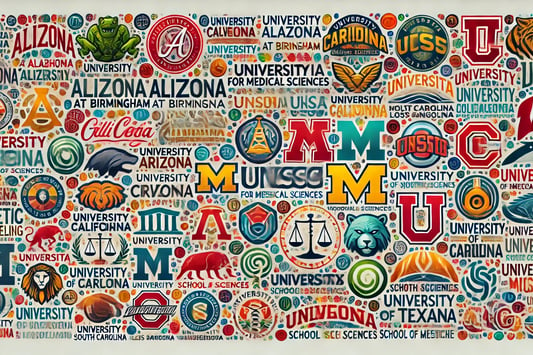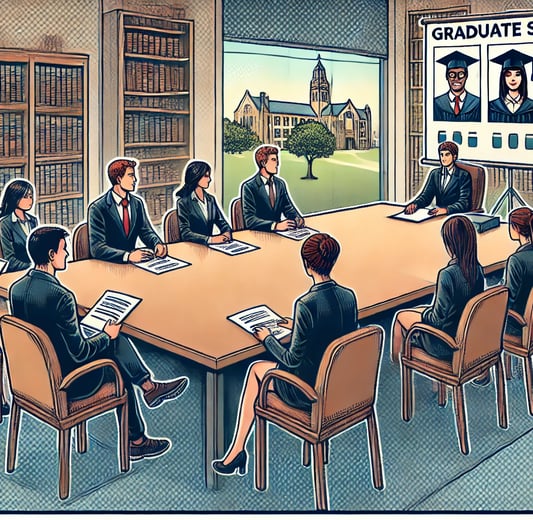A Comprehensive Guide to Gaining Admission to Genetic Counseling Programs
Discover what genetic counseling programs seek in applicants, including academic excellence, relevant experience, and key personal qualities.
CAREER ADVICEAPPLICATION HELPSCHOOL ADVICE


A Comprehensive Guide to Gaining Admission to Genetic Counseling Programs
Genetic counseling programs are highly selective, seeking applicants who not only excel academically but also possess the relevant experience and personal qualities necessary for the profession. As the demand for genetic counselors increases, so does the competition for spots in these programs. Understanding what admissions committees look for can significantly enhance your chances of success.
This guide will delve into the essential aspects that genetic counseling programs typically emphasize, offering insight into how to present yourself as a compelling candidate.
Why Genetic Counseling Programs are Highly Competitive
The field of genetic counseling is both challenging and rewarding, requiring a unique blend of scientific knowledge, clinical experience, and interpersonal skills. With advancements in genetics and the increasing complexity of patient care, the need for well-trained genetic counselors is growing. This demand, coupled with the limited number of accredited programs, makes the admissions process highly competitive.


Strong Academic Background in the Sciences
Academic excellence forms the foundation of a successful application. Programs expect applicants to have a robust understanding of biological sciences, as this knowledge is critical in interpreting genetic data and providing accurate counseling.
Strong Science Foundation: Most applicants come from life sciences backgrounds, with degrees in biology, genetics, biochemistry, or related fields. This academic preparation is essential for grasping the complex concepts covered in genetic counseling curricula.
GPA Requirements: A GPA of 3.5 or higher is generally considered competitive. However, many programs adopt a holistic review process, meaning that a slightly lower GPA can be offset by other strengths such as extensive experience or exceptional personal qualities.
Relevant Coursework: Coursework in genetics, psychology, embryology, and statistics is often recommended or required. These subjects are directly relevant to the responsibilities of a genetic counselor, providing a crucial knowledge base for both the academic and practical aspects of the profession.




Gaining Relevant Experience: Beyond the Classroom
While academic achievements are important, relevant experience in clinical, research, and counseling settings is equally critical. Admissions committees are interested in candidates who have a real-world understanding of the profession and have demonstrated their commitment through hands-on experience.
Genetic Counseling Shadowing: Shadowing a practicing genetic counselor offers invaluable insights into the day-to-day responsibilities of the role. This experience helps applicants confirm their interest in the field and provides a realistic view of the challenges and rewards of genetic counseling.
Clinical Experience: Working in healthcare settings, such as hospitals or clinics, equips applicants with practical skills in patient care. Roles such as medical assistants, volunteers, or patient advocates allow candidates to develop empathy, communication skills, and an understanding of the patient experience, all of which are crucial for genetic counselors.
Research Experience: Involvement in research, particularly in genetics or related fields, demonstrates an applicant's ability to engage in scientific inquiry and critical thinking. This experience is particularly valuable for understanding the research aspect of genetic counseling, including the interpretation of genetic data and the application of research findings to patient care.
Advocacy or Counseling Experience: Experience in counseling, social work, or advocacy—such as working with support groups or crisis hotlines—shows that an applicant is capable of providing emotional support and understanding complex personal situations. These skills are essential for genetic counselors, who often work with individuals facing difficult and emotional decisions.




Essential Personal Qualities for Genetic Counseling
The personal qualities of an applicant are as crucial as their academic and experiential background. Genetic counseling is a profession that requires not only intellectual capability but also emotional intelligence, cultural sensitivity, and resilience.
Empathy and Compassion: The ability to understand and share the feelings of others is central to the role of a genetic counselor. Applicants who demonstrate a natural ability to provide emotional support will stand out in the admissions process.
Communication Skills: Genetic counselors must explain complex genetic information in a way that is accessible and understandable to patients and their families. Strong verbal and written communication skills are therefore essential.
Critical Thinking: The profession involves analyzing genetic information, assessing risks, and making informed recommendations. Applicants need to demonstrate their ability to think critically and make decisions based on a synthesis of information.
Cultural Competence: Sensitivity to diverse cultural backgrounds is important in genetic counseling, as patients come from various communities with different beliefs and values. Applicants should show an understanding of how to provide care that is respectful and appropriate for all individuals.
Professionalism and Integrity: Reliability, teamwork, and a commitment to ethical practice are key qualities. Genetic counselors work closely with other healthcare professionals and must maintain high standards of professional conduct.
Resilience: Genetic counseling can be emotionally demanding, requiring counselors to navigate challenging situations while maintaining professional boundaries. Applicants should demonstrate their ability to cope with stress and remain focused on their responsibilities.




The Importance of Strong Letters of Recommendation
Letters of recommendation are a crucial component of the application process. They provide admissions committees with an external perspective on an applicant’s suitability for the program.
Strong Endorsements: Letters should come from individuals who can speak to the applicant’s academic abilities, clinical experience, and personal qualities. Ideally, these should be professionals who are familiar with the field of genetic counseling and can provide specific examples of the applicant's strengths.


Crafting a Compelling Personal Statement
The personal statement is an opportunity for applicants to articulate their motivations for pursuing a career in genetic counseling and to demonstrate their alignment with the program’s values.
Clear Motivation: Applicants need to clearly express why they are drawn to genetic counseling and how their experiences have prepared them for this career. This section should reflect a deep understanding of the profession and a genuine passion for the field.
Alignment with Program Values: Each genetic counseling program has its own mission and values. Applicants should tailor their personal statements to reflect an alignment with these values, showing that they are a good fit for the program.


Excelling in the Interview Process
If invited to interview, applicants must be prepared to demonstrate their qualifications in person. The interview is an opportunity to show professionalism, confidence, and a genuine commitment to genetic counseling.
Professional Demeanor: During the interview, applicants should present themselves professionally, with confidence and enthusiasm. This is a chance to make a strong impression and to demonstrate their readiness for the challenges of the program.
Reflective and Insightful Responses: Interviewers look for candidates who can reflect on their experiences and articulate how those experiences have prepared them for a career in genetic counseling. Thoughtful, well-considered responses are key to a successful interview.
How to Stand Out Among Competitive Applicants
Given the competitive nature of genetic counseling programs, applicants must find ways to differentiate themselves from other candidates. Here are some strategies:
Showcase Unique Experiences: Highlight any unique experiences that set you apart, whether it’s a specific research project, a volunteer experience, or an unusual educational background. These can provide a distinctive edge in the application process.
Demonstrate Passion for the Field: Passion is often the deciding factor between equally qualified candidates. Use every part of your application to convey your genuine interest in genetic counseling and your commitment to making a difference in the field.






